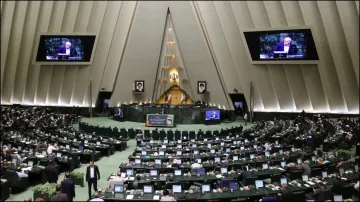Tehran: In a significant development, Iran's hardline parliament on Wednesday approved all members of reformist President Masoud Pezeshkian’s Cabinet, marking the first time since 2001 a leader has been able to get all of his officials through the body. All 19 officials won approval in an afternoon vote, including Abbas Araghchi, 61, a career diplomat who will be Iran’s new foreign minister.
Araghchi was a member of the Iranian negotiating team that reached a nuclear deal with world powers in 2015 that capped Tehran’s nuclear program in return for the lifting of sanctions. The deal fell apart in 2018 when former US President Donald Trump withdrew from the agreement and imposed more sanctions on Iran. Pezeshkian has promised to try to revive the nuclear deal.
Aziz Nasirzadeh, who received the most support from Iranian lawmakers with 281 votes out of 288, will become the next Defence Minister. Nasirzadeh was chief of the Iranian air force from 2018 to 2021. Mohsen Paknezhad has been appointed as the minister of oil and Mohammad Reza Zafarghandi, who received the lowest votes at 163, will assume the position of the health minister.
First woman minister in Iranian Cabinet
The only female minister proposed, Housing and Road Minister Farzaneh Sadegh, a 47-year-old architect, received 231 votes. She is the first female minister in Iran in more than a decade. The approval marks an early win for Pezeshkian, a longtime lawmaker who found himself catapulted into the presidency after a helicopter crash in May killed his hardline predecessor Ebrahim Raisi.
Pezeshkian immediately posted an image online with him standing next to Iran’s judiciary chief, a Shiite cleric, and the country’s parliament speaker Mohammad Bagher Qalibaf, a hardliner he faced during the June presidential elections. “Consensus for Iran,” he wrote in the caption.
Dropping proposed ministers has been a tradition in Iran’s parliament, making Pezeshkian’s success that much more striking. Former reformist President Mohammad Khatami was the only president who received the vote of confidence for all of his proposed ministers in both 1997 and 2001.
Pezeshkian's reformist promises
In this campaign earlier this year, Pezeshkian’s advocates have sought to contrast him against the “Taliban” policies of Jalili. His campaign slogan was “For Iran" based on a popular song written by Iranian singer-songwriter Shervin Hajipour, who has been sentenced to more than three years in prison over his anthem for the Mahsa Amini protests.
Pezeshkian has long called for detente with the West, economic reform, social liberalisation and political pluralism, in the midst of economic stagnation, corruption, mismanagement and restrictions on social and political freedom that have dissuaded voters from the elections, resulting in a historic low turnout.
However, many voters are sceptical about Pezeshkian's ability to fulfil his campaign promises as the former health minister has publicly stated that he had no intention of confronting Iran's power elite of clerics and security hawks. Under Iran's dual system of clerical and republican rule, the president cannot usher in any major policy shift on Iran's nuclear programme or support for militia groups across the Middle East, since Supreme Leader Ayatollah Ali Khamenei has the final say on top state matters.
(with inputs from agencies)
Latest World News
